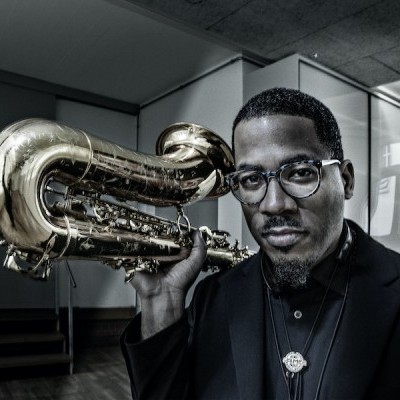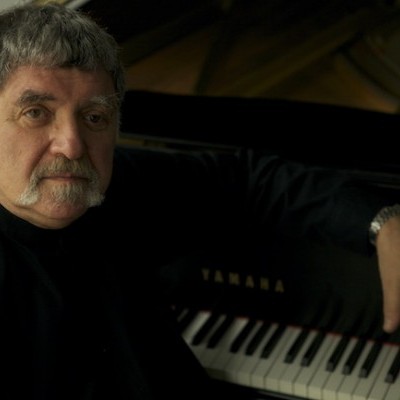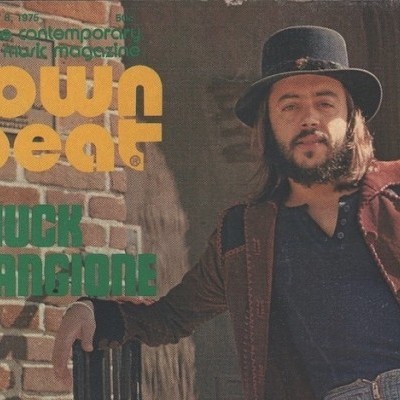Jul 17, 2025 12:44 PM
DownBeat’s 73rd Annual Critics Poll: One for the Record Books
You see before you what we believe is the largest and most comprehensive Critics Poll in the history of jazz. DownBeat…
Trumpeter Theodore “Fats” Navarro died more than a half century ago at the tender age of 26. He was buried in an unmarked grave, number 414, at the Rose Hill Cemetary in Linden, N.J.
Fats was gone, but not forgotten.
On an unseasonably warm day this past September, a small group of family, friends and fans gathered at that grave site to dedicate a headstone for Fats Navarro’s final resting place. A choir from Linden High School sang “Amazing Grace” and trumpeter Jon Faddis played Navarro’s “Nostalgia.”
Navarro earned his nickname for the fat tone he got out of the trumpet. He began playing trumpet at the age of 13, and began touring at a very early age with Dance bands around his home state of Florida and beyond. He joined Andy Kirk’s Band in 1943 before Billy Eckstine hired him in 1945. But he is best known for his Bebop explorations with the likes of Coleman Hawkins, Bud Powell, Roy Haynes, Dexter Gordon, Sonny Rollins, and especially Tadd Dameron.
“Fats played with a lot of humor, subtle humor,” said Faddis. “He loved to quote from popular songs. He had a very powerful drive He was alway developing and working on his skills as a musician. Last night I was talking with Clark Terry and Clark said that Fats could be a little competitive. There was a trumpet player in Billy Eckstine’s band, a lead trumpet player, named Hobart Dotson. And Fats would tell him, and I’m quoting Clark Terry, ‘Man, you go out and play what you’re gonna play because the note you end on is the note I’ll start on.’
Navarro died young due to a combination of tuburculosis and heroin addiction.
“Fats death at a very young age, at the age of 26, teaches us and reminds us to take very good care of ourselves,” Faddis added. “Too many our great musicians, jazz musicians, masters died too soon and didn’t have the things they needed to have in place. Which is why we’re here today, some 52 years later. As a trumpet player I just wonder sometimes what his music might have been like if he had lived a longer life.”
“I would just like to recite something that my father, a methodist minister, told me many years ago,” said trumpeter Donald Byrd. “He used to tell me about the words to pass, to pass by and to pass on. To pass is to perish. To pass by is to pas many of the road of life. Most importantly though, is what we pass on. Fats passed on a great deal to us all.”
“He was appreciated by the musicians,” said jazz critic Ira Gitler. “The jazz critics acknowledged him. But there were great things ahead, if he hadn’t died young. His legacy is marked by all the trumpet players who came behind him and were influenced by him like Clifford Brown. From Clifford it branched out to Donald Byrd, to Woody Shaw to Freddie Hubbard, Booker Little. Today, you hear people like Roy Hargrove still being influenced by Fats. He was a tree and the branches were many.”
The headstone dedication kicked off a day of tributes honoring Navarro. The Jazz Alliance International, a non-profit organization dedicated to expanding audiences for jazz, sponsored a symposium on the history jazz at Linden High School in honor of Navarro. The mayor of Linden proclaimed it Fats Navarro Day.
That night in another JAI-sponsored event, 14 trumpeters joined a stellar rhythm section to honor the Navarro songbook at The Jazz Standard in Manhattan. Assembled by Faddis, with musical direction from Don Sickler, the talent served as a Who’s Who of New York trumpeters backed by Billy Drummond on drums, Peter Washington on bass and James Williams on Piano.
As jams sessions go, this was a classic. Trumpeters came out in groups of four-to-six at a time, eliminating the question of how they could pull this off with so many horns at once. Sickler’s arrangements for the event helped to give the tunes beautiful and cohesive heads. Then it was up to the soloists.
Tom Harrell, Brian Lynch, Jeremy Pelt and Sickler took their shots on “Barry’s Romp.” Le

James Brandon Lewis earned honors for Artist of the Year and Tenor Saxophonist of the Year. Three of his recordings placed in the Albums of the Year category.
Jul 17, 2025 12:44 PM
You see before you what we believe is the largest and most comprehensive Critics Poll in the history of jazz. DownBeat…

Galper was often regarded as an underrated master of his craft.
Jul 22, 2025 10:58 AM
Hal Galper, a pianist, composer and arranger who enjoyed a substantial performing career but made perhaps a deeper…

Chuck Mangione on the cover of the May 8, 1975, edition of DownBeat.
Jul 29, 2025 1:00 PM
Chuck Mangione, one of the most popular trumpeters in jazz history, passed away on July 24 at home in Rochester, New…
Jul 17, 2025 11:35 AM
The DownBeat Critics Poll provides a wonderful snapshot of the jazz scene today, with much to explore and many great…

Jordan was a dyed-in-the-wool bebopper whose formative musical experiences were with Charlie Parker.
Aug 12, 2025 10:24 AM
Sheila Jordan, a vocalist who was celebrated for her scatting and lyric-improvising abilities, died Aug. 11 at her home…